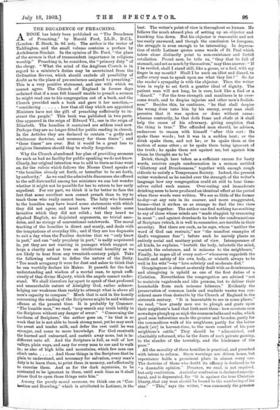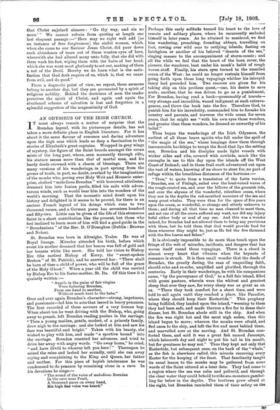THE DECADENCE OF PREACHING.
ABOOK has lately been published on "The Decadence of Preaching," by Harold Ford, LL.D., D.C.L. (London: E. Stock, 2s. 6d. net). The author is the rector of Taddington, and the small volume contains a preface by Archdeacon Sinclair. In the opinion of Dr. Ford, "the place of the sermon is that of transcendent importance in religious worship." Preaching is, he considers, the "primary duty" of the clergy. "What the mind of the Anglican Church is in regard to a minister's duties may be ascertained from the Ordination Service, which should exclude all possibility of doubt as to the place of pre-eminence assigned to preaching." This is a very positive statement, and one with which we cannot agree. The Church of England in former days ordained that if a man felt himself unable to preach a sermon he might read one to his congregation out of a book, and the Church provided such a book and gave it her sanction,—
" considering bow that all they which are appointed Ministers have not the gift of preaching sufficiently to in- struct the people." This book was published in two parts. One appeared in the reign of Edward VI., one in the reign of Elizabeth. The homilies it contained are seldom read now. Perhaps they are no longer fitted for public reading in church. In the Articles they are declared to contain "a godly and wholesome doctrine, and necessary for these times " ; and "these times" are over. But it would be a great loss to religious literature should they be wholly forgotten.
Why the Church abandoned her plan of providing sermons for such as had no facility for public speaking we do not know. Clearly, her original intention was to add to them as time went on, for the rubric which follows the Nicene Creed speaks of "the homilies already set forth, or hereafter to be set forth, by authority." As we read the admirable discourses she offered to the self-distrustful among her ministers we can but wonder whether it might not be possible for her to return to her early expedient. For our part, we think it is far better to face the fact that some excellent men cannot preach than to try to teach those who really cannot learn. The laity who listened to the homilies may have heard some statements with which they did not agree, and must have writhed under some invective which they did not relish ; but they heard no slipshod English, no disjointed arguments, no trivial anec- dotes, and no strings of conventional catchwords. The moral teaching of the homilies is direct and manly, and deals with the temptations of everyday life ; and if they are too dogmatic to suit a day when the Pauline doctrine that we "only know in part," and can "only prophesy in part," is sadly acquiesced in, yet they are not wanting in passages which suggest as large a charity and as true an intellectual humility as we are likely to hear from any twentieth-century pulpit. Take the following refusal to define the nature of the Deity. "Too much arrogancy it were for dust and ashes to think that he can worthily declare his Maker. It passeth far the dark- understanding and wisdom of a mortal man, to speak suffi- ciently of that divine Majesty, which the angels cannot under- stand. We shall therefore lay apart to speak of that profound and unsearchable nature of Almighty God, rather acknow- ledging our weakness than rashly to attempt what is above all men's capacity to compass." Much that is said in the homily concerning the reading of the Scriptures might be said without offence at the present time. It is probably by Cranmer. "The humble man," we read, "may search any truth boldly in the Scripture without any danger of error." "Concerning the hardness of Scripture," the author goes on, "he that is so weak that he is not able to brook strong meat, yet he may suck the sweet and, tender milk, and defer the rest until he wax stronger, and come to more knowledge. For God receiveth the learned and unlearned, and casteth away none, but is in- different unto all. And the Scripture is full, as well of low valleys, plain ways, and easy for every man to use and to walk ; as also of high hills and mountains, which few men can climb unto And those things in the Scripture that be plain to understand, and necessary for salvation, every man's duty is to learn them, to print them in memory, and effectually to exercise them. And as for the dark mysteries, to be contented to be ignorant in them, until such time as it shall please God to open those things unto him."
Among the purely moral sermons, we think one on " Con- iention and Brawling," which is attributed to Latimer, is the best. The writer's point of view is throughout so human. He follows the much abused plan of setting up an objector and knocking him down. But his objector is reasonable and not too easily answered, and though the conclusion be foregone, the struggle is even enough to be interesting. In depreca- tion of strife Latimer quotes some words of St. Paul which taken alone distinctly point to non-resistance and forbid retaliation. Proud men, he tells us, "they that be full of stomach, and set so much by themselves," may thus answer: "If I be reviled, shall I stand still, like a goose, or a fool, with my finger in my mouth ? Shall I be such an idiot and dizard, to suffer every man to speak upon me what they list P" So far the reader's sympathy is with the objector. Then the writer tries in reply to set forth a gentler ideal of dignity. The patient man will not long, he is sure, look like a fool or a " dizard." "For the true strength and manliness is to over- come wrath, and to despise injuries and other men's foolish- ness." Besides this, he continues, "he that shall despise the wrong done unto him by his enemy, every man shall perceive that it was spoken or done without cause : whereas contrarily, he that cloth fume and chafe at it shall help the cause of his adversary, giving suspicion that the thing is true." The offended man should, he advises, endeavour to reason with himself "after this sort : He spake these words ; but it was in a sudden heat; or the drink spake them, and not he; or he spake them at the motion of some other ; or he spake them being ignorant of the truth; he spake them not against me, but against him whom he thought me to be."
Drink, though here taken as a sufficient excuse for hasty words, receives ample condemnation in a sermon entitled "Gluttony and Drunkenness," together with enough rough ridicule to satisfy a Temperance Society. Indeed, the present writer wondered as he smiled over the strength of the writer's language how any congregation could sit still to hear them- selves called such names. Over-eating and immoderate drinking seem to have produced an identical effect at the period when these words were written. We see so little of the former to-day--at any rate in its coarser, and more exaggerated, forms—that it strikes us as strange to find the two vices bracketed together. The author can find nothing too scathing to say of those whose minds are "made sluggish by cramming in meat " ; and against drunkards he hurls the condemnations of Scripture (which, it is well to remember, are terrible in their severity). But there are such, as he says, whom "neither the word of God can restrain," nor "the manifest examples of God's vengeance fear"; before such he naively places an entirely social and sanitary point of view. Intemperance of all kinds, he explains, " hurteth the body, infecteth the mind, wasteth the substance, and is noisome to the neighbours." Finally, he urges all of every sort—" whosoever regardeth the health and safety of his own body, or wisheth always to be well in his wits"—to "love sobriety and moderate diet."
Graspingness is almost as sternly dealt with as drunkenness, and _almsgiving is .upheld as one of the first duties of a Christian. Nevertheless the congregation are advised "not to maintain vagabonds and idle persons, but to deliver their households from such noisome loiterers." Evidently the preservation of common lands and roadside wastes was con- sidered more than desirable by the Church of England in the sixteenth century. "It is lamentable to see in some places," we read, "how greedy men use to plough and grate upon their neighbour's land that lieth next them : how covetous men nowadays plough up so nigh the common balks and walks, which good men beforetime made the greater and broader, partly for the commodious walk of his neighbour, partly for the better shack [sic) in harvest-time, to the more comfort of his poor neighbour's cattle." They should be "admonished, and charitably reformed, who be the doers of such private gaining, to the slander of the township, and the hindrance of the poor." All the morality of these homilies is practical, and preached with intent to reform. Stern warnings are driven home, but repentance holds a prominent place in almost every one. The doctrine of those who doubt its efficacy is declared to be "a damnable opinion." Penance, we read, is not required, but only restitution. Auricular confession is declared unscrip- tural, and is deprecated, for "it is against the true Christian liberty, that any man should be bound to the numbering of his sins." "This," says the writer, "was commonly the penance
that Christ enjoined sinners : ' Go thy way, and sin no snore.'" We cannot refrain from quoting at length one last eloquent passage:—" Here may we right well add [as an instance of free forgiveness] the sinful woman, which, when she came to our Saviour Jesus Christ, did pour down such abundance of tears out of those wanton eyes of hers, wherewith she had allured many unto folly, that she did with them wash his feet, wiping them with the hairs of her head, which she was wont most gloriously to set out, making of them a net of the Devil. Hereby we do learn what is the satis- faction that God doth require of us, which is, that we cease from evil, and do good."
From a dogmatic point of view, we repeat, these sermons belong to another day, but they are permeated by a spirit of religious nobility. Behind the doctrines of men the reader perceives the spirit of Christ, and again and again the straitened scheme of salvation is lost and forgotten in a splendid suggestion of the magnanimity of God.











































 Previous page
Previous page